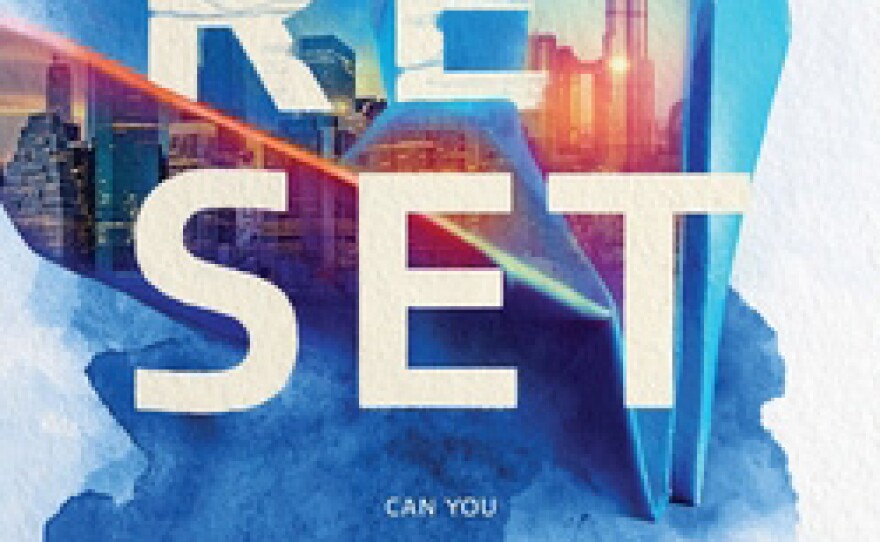Sarina Dahlan's new book all started with a reset.
"I was writing this story — I was at like 50,000 words — and all of a sudden I just decided I hated it. I hated thinking about it. I was mad at myself for wasting all this time," Dahlan said.
So she deleted it. All 50,000 words.
"This was probably three o'clock in the morning. I was exhausted, I was upset, but then I was staring at this blank screen and the idea just came to me. It was a question really: 'What if we can erase our minds?'"
Virtual author event
Sarina Dahlan will discuss "Reset" with author Ruth Mitchell in a virtual event with Mysterious Galaxy on Monday, May 31 at 7 p.m.
"Reset" unfolds in a distant future — years after "The Last War" ravaged the planet, leaving a scant few survivors to rebuild society with the hopes of preserving peace and preventing another war or crisis. Four cities remain, where all of humankind is housed, fed and given a functioning role in society.
Every four years, each citizen's memories are reset, and they awaken in a new setting, with a new name and role. We primarily follow Aris, a woman who works at the Natural History Museum, and Metis, a piano virtuoso.
Aris is charming and pragmatic. She loves her life in Callisto, one of the remaining four cities, modeled after New York City. She appreciates her part in "Tabula Rasa," the process of the reset, and gladly forgoes attachments to anyone except Lucy, her AI assistant.
We also meet Metis early on, though it's clear he is less satisfied with that life and his reset existence. Metis holds onto memories and is part of an underground community of "dreamers" who use a serum called "Absinthe" to try to unlock memories hidden in their dreams.
For Metis and the dreamers — some more rebellious than others — the reset is not a choice.
Dahlan's book tackles ideas of generational trauma and hate, and the idea that society can only function in a peaceful way if humans are not trusted to do it themselves; they need to have it crafted for them.
She created the Four Cities to be — on the surface — equitable, idyllic places where all of the problems of human life are taken care of.
"In the world of 'Reset,' all of the human shortcomings that we have today are taken out of our hands. Homelessness by providing homes for everyone, assigning homes for everyone. Extreme capitalism by the idea that there's no money but everyone is given this point system. Hatred and racism is taken out of their hands by mixing, randomly mixing everyone's DNA. So choice is taken away in order to achieve a utopia," Dahlan said.
She also draws on Buddhist teachings of detachment being the true path to nirvana — the parallel is that by eschewing worldly connections every four years, the humans in the Four Cities can be unburdened and purely happy.
"If memories are the seeds of all of our attachment, then it just makes logical sense that the shortcut to peace would be the erasure of memories," Dahlan said.
For Aris, it's not Metis, but a friend — he first shows up as a one-night stand — who begins to chip away at her utopia. Benja starts telling Aris about his dreams, and his sense of restlessness.
"How can you know a new experience isn't an old one?" Benja asks Aris early on in their friendship. "I think there's something I'm supposed to find out about the past."
Benja, obsessed with a man in his dreams, leads Aris to the world of the dreamers, and ultimately to Metis, and to one of the book’s most important questions: Can you love someone you don’t remember?
"I immediately knew that it had to be between two people," Dahlan said. "I love books where you get intimate moments between people because I think that's what makes it relatable, and it gives this sense of loss, this universal sense of loss and longing and love that we each have experienced in our lives," Dahlan said. "And I wanted to kind of bring down that big idea that I had and distill it and make it something that the readers can kind of relate to and go, 'Yeah, what would I do if I actually lived in this utopia?'"

Dahlan's book also dwells in a world where art, literature and music reign. Because memories are erased and names changed every four years, there are no movies or TV shows in the Four Cities, except those that were created before the Last War. Music and literature are then just as important to the characters as they are to Dahlan herself — whether in Metis' piano music or in the significant use of books and texts by Gabriel García Márquez, Marcel Proust and Charles Dickens.
"I have always been a reader first," Dahlan said. "That was how I kept myself entertained. I grew up in Bangkok, and my grandmother who raised me was quite protective so I didn't get to go out and play a lot, but our house had this library filled with books."
Her childhood home in Thailand was in a neighborhood of Indonesian immigrants. While the dominant culture was Buddhist, she was also surrounded by a lot of diversity and backgrounds by virtue of living in a port city.
"There's a lot of ghost stories floating around, and they're scary stories but they're also used to share cultural information to kind of teach lessons, so in the same way that Western culture had fairy tales — which in itself can be gruesome — we had ghost stories."
In "Reset," these ghosts are previous versions of each individual. And while the idea that humans may need their lives rebooted every four years came from a desire for peace, it's not coming from a place of choice.
Dahlan said that she wants this story to raise questions about how we understand each other, and the generational trauma of the past — however violent or troubling — is part of that.
"That's where we learn empathy. That's where we learn to put ourselves in another person's shoes. I just think that we are so capable of shedding the old skin of historical pains," Dahlan said, however valid that pain is. "The lesson that I got from the idea of memory erasure in 'Reset,' it's learning to shed certain things that were passed down to us. We don't have to accept them, but in 'Reset' it wasn't a choice. The system kind of chose it for you, because they'd already given up this faith in humanity. But I have faith in humanity."









